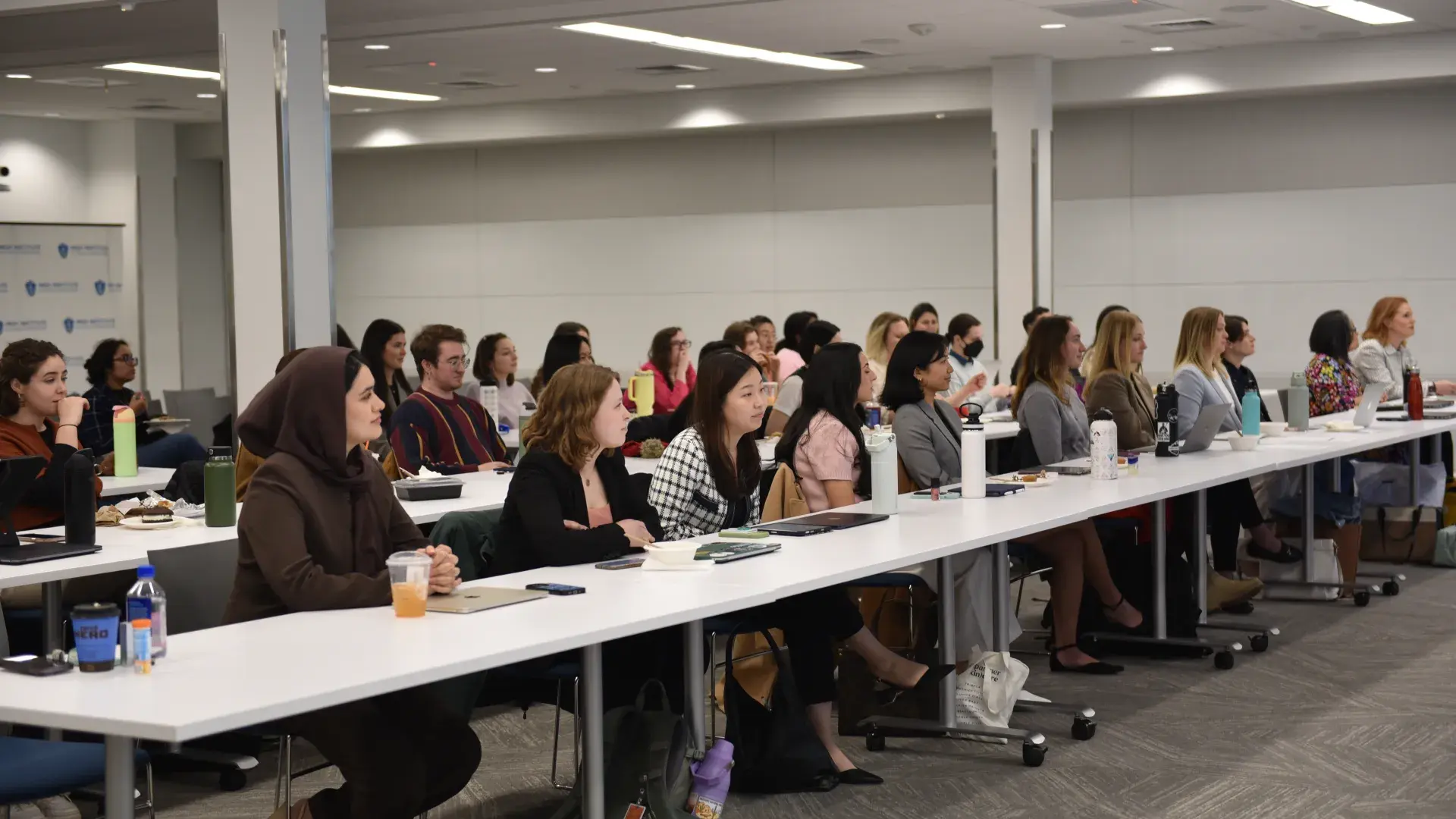
For the 23 students in the Genetic Counseling Program Class of 2025, the focus of much of their work culminated with their capstone project presentations. As family, friends, fellow students, and faculty watched in 1CW and online, each student had 15 minutes to discuss their projects and answer questions on one of two days dedicated to the presentations — Friday, April 11 or Thursday, April 17.
The students start the capstone process at the beginning of the program, spending the fall and spring semester of the first year coming up with the idea and developing the plan for the project. Once the plan is in place, data collection begins for most in late spring and early summer of that first year, and work continues throughout the second year. In addition to the oral presentation, they submit a written manuscript as the final deliverable in April before they graduate.
“Most of our students go on to present their projects at national conferences and many publish them in peer-reviewed journals,” said Direct of Student Research Allison Cirino, who is the instructor for four courses that are the backbone of the capstone process for genetic counseling students.
Cirino is also responsible for ensuring the students have projects and committees to support the development and execution of their projects throughout the whole process.
“A source of pride for our program is that we have many program alums who come back to serve on Capstone committees,” said Cirino. “For the Class of 2025 we had six alums, representing all four graduating classes to date, supporting five different student projects.”
The Class of 2025 students and their capstone project titles are:
· Salma Khalid Taher - Ḥikāyāt: Exploring Genetic Counseling Utility Through The Lens of Mothers of Individuals With Down Syndrome In Saudi Arabia
· Madelyn Falk - A Retrospective Exploration of Healthcare Communication with Adult Siblings of Individuals with Down Syndrome Over Time
· Megan Moran - Fragile X Syndrome Carriers’ Experience with Guilt and Shame Associated with Genetic Test Results Disclosure
· Somin Hwang - Arriving at a diagnosis: Effective strategies used by the Undiagnosed Diseases Network
· Laura Blakemore - Addressing accessibility: graduate school support for genetic counseling students requesting accommodations in the US
· Mahnoor Fatima - Genetic Counselors and Bioinformatics: Perspectives from the Field
· Danielle Napoli - Perceptions of MGB Primary Care Providers on the Use of AI to Integrate Genetics into Practice
· Madison Le - Psychosocial and Emotional Support Needs for Parents of Children with Crouzon
· Lilly Hagan-Calzada - Alumni Assessment of Standardized Patients in Genetic Counseling Curriculum: A Mixed-Methods Study for Quality Improvement
· Thieny Le - An Assessment of the Current Landscape of Prenatal Genetic Testing for Incarcerated Patients
· Makena Caron - Cardiomyopathy and Scan-Related Anxiety: Understanding the Prevalence, Predictors, and Impact on Screening Adherence
· Kathy Chu - Genetic Screening for MODY: Improving Diagnostic Accuracy and Patient Management
· Joevy Sum and Yuka Kato - A Comparison Between International Genetic Counseling Student and Program Leader Perspectives on Resources for International Genetic Counseling Students
· Jackson Pearce - Exploring Autonomy and Patient Satisfaction in Healthcare: Perspectives from Adults with Down Syndrome
· Michelle Malizio - Exploring the yield of RASopathy variants in patients with Hypertrophic Cardiomyopathy
· Michelle Duffe - Impact of gnomAD v4 on BS1 Application
· Sidney Ching - Decision-making Around Pre-Implantation Genetic Testing by Individuals with Neurofibromatosis Type I: A Qualitative Study
· Taylor Urban - Evaluating the Impact of Negative and Uncertain Germline Genetic Testing Results on Patients with Breast Cancer in Traditional and Mainstream Genetic Testing Models
· Kathleen Ohman - Genetic counselors’ perspectives on risk communication for cardiovascular genes that cause dominant and recessive conditions
· Madison Mae Chilian - A Qualitative Study of Transgender and Gender Diverse Individuals’ Perspectives on Preconception and Prenatal Genetic Testing for Nonmedical Sex Selection
· Alexis James Shugars - Impact of Family Communication Letters on Patients with Cancer Predisposition Syndromes
· Brittany Stokes - Perceptions and Practices of Pharmacogenomic Stakeholders Regarding the Collection and Application of Race, Ethnicity, and Ancestry Data
